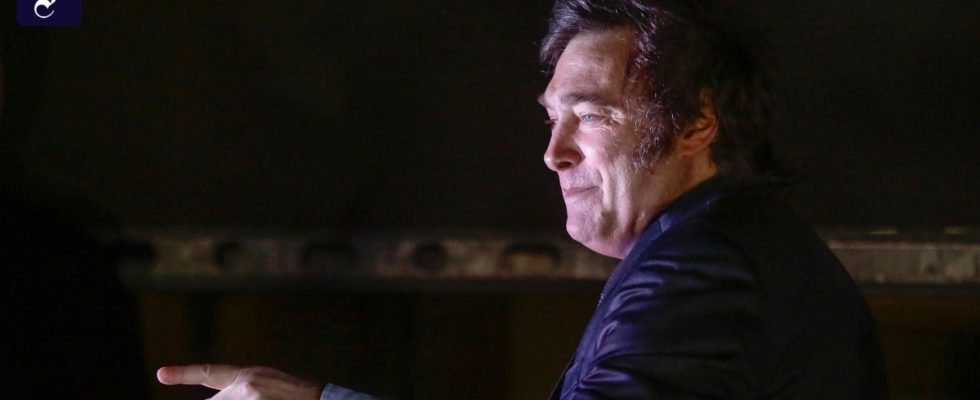DThe libertarian Javier Milei has clearly prevailed in the runoff election for the presidency of Argentina. Milei won almost 55.7 percent of the valid votes in a duel against his opponent from the center-left government, Economy Minister Sergio Massa. Even before the official election results were known on Sunday evening, the post-election polls and leaked interim results left less and less doubt about Milei’s victory. When Massa turned to the public and admitted his defeat, his fellow campaigners at Mileis’ campaign headquarters fell into each other’s arms. On the street outside the hotel, the crowd of Milei supporters erupted in cheers and chants as if Argentina had won another World Cup.
Milei took his time with his appearance. “Freedom, freedom!” screamed the guests in the hall. “It seems so,” Milei said, smiling. The reconstruction of Argentina begins today, Milei promised. We will return to the ideas of the founding fathers, which made Argentina one of the richest countries in the world. The major problems facing the country can only be solved with more freedom. The model of inefficiency that has ruled for decades must be ended. “Argentina has a future,” said Milei, “and it is liberal.”
Milei went into the runoff as the slight favorite. However, the latest polls a week before the election had predicted a close race. In the final phase of the election campaign, Massa was unable to mobilize voters from the center. Different Milei. A decisive factor was the support of the candidate from the conservative opposition alliance, Patricia Bullrich, who was eliminated in the first round, and the former President Mauricio Macri. Shortly after the first round of voting and without consultation with their party, the two threw their support behind Milei, justifying this with the need for change that only Milei could guarantee. In his short speech, Milei thanked Macri and Bullrich for “enabling the change” that Argentina needed.
The political horse trading begins
What Macri is demanding in return is not known. After joining forces with Macri, Milei took a more conciliatory course and qualified several of his radical demands, such as cutting all social benefits and abolishing a number of ministries and the central bank. Whether personalities from the Macri camp will find a place in the future government is the subject of speculation. Milei said everyone is welcome. “What unites us is more important than what divides us.”
Milei didn’t just need a strong ally for the election. Even as president, he will be the same if he wants to implement even a small part of his promises. His libertarian alliance “Freedom Advances” only has a small number of seats. However, the traditional conservative alliance around former President Macri has been severely strained in this election. Some observers also speak of a break. The election will inevitably lead to a realignment of political alliances and distribution of power. It therefore remains to be seen whether Milei will succeed in forging majorities. Meanwhile, the Peronist Party is being pushed into opposition, which could inspire the radical forces surrounding former president and current vice president Cristina Kirchner.
An equally big question mark is the future president’s cabinet. Argentina only has three weeks left for the change of government. That is a short time for an elected president who has neither political experience nor a strong party with outstanding people behind him to fill the important positions in the government and the state – however minimal this could be according to Milei’s ideas. At the same time, the economic situation is very tense. Milei himself said Argentina’s situation is critical. Argentina is fighting against annual inflation of almost 150 percent, four out of ten Argentines are poor. The country is deeply in debt and is constantly fighting against the next bankruptcy. According to economists, dollarization, as Milei promises, would have high social costs. Such a step would currently not find much support in the economy or among the population, as surveys show. And the reforms that the future president wants to implement and which are likely to be supported by large parts of the current opposition will take time – which will run out of time for the country even after the change of government.

